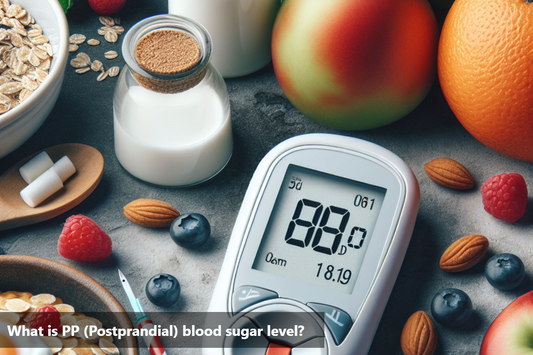When you hear the word ‘diabetes,’ you probably think of elevated blood sugar. Years before you get diagnosed with diabetes, hyperglycemia and high levels of insulin, the hormone that regulates blood sugar levels begins to damage your body silently. Diabetes may not cause any symptoms at first. That is one of the reasons why millions of individuals are unaware they have it.
Blood sugar levels are an important aspect of your overall health. Diabetes can develop if your blood sugar levels are out of balance for an extended period of time. Diabetes causes your pancreas to produce either too little or no insulin and sometimes the produced insulin cannot be used efficiently.
Diabetes can be efficiently controlled if caught early. However, if left untreated, it might cause complications that may harm your system.
Diabetes is associated with damage to major blood vessels, referred to as macrovascular complications, and damage to small blood vessels referred to as microvascular complications.
The macrovascular complication includes:
- heart attack
- stroke
- peripheral arterial disease
Microvascular complications may cause issues with the:
- eyes
- kidneys
- nervous system
Cardiovascular diseases - Damage to the heart
The cardiovascular or circulatory system includes the heart. Your blood vessels, which provide oxygen and nutrients to your organs and tissues, are a part of this biological system as well. Your risk of getting high blood pressure is increased by diabetes, which puts additional strain on your heart. Globally cardiovascular disease (CVD) is a major cause of death amongst diabetics. The prevalence of coronary artery diseases in Indians living in India is 21.4% for diabetics and 11% for non-diabetics.
Medical studies suggest that high blood glucose levels may promote the growth of fat deposits in blood vessel walls. Over time, it may reduce blood flow and increase the risk of atherosclerosis, or hardening of the blood vessels. People with diabetes thus frequently face more serious heart problems at a younger age than those without the disease.
Neuropathy - Damage to the nervous system
Nearly everyone with diabetes develops neuropathy, often known as nerve damage. Your body may experience numbness in some areas or have other issues. Your heart and all other organs depend on strong nerves. Leg and foot pain is a typical indication that something is wrong
Peripheral neuropathy, i.e., nerve damage to limbs and autonomic neuropathy, i.e. nerve damage to the autonomous system that controls the digestive system, heart rate, sex organs, etc. A classic example of this is vagus nerve impairment.
This is the nerve that connects the brainstem to the stomach. When the vagus nerve is injured, a disease known as gastroparesis develops. This is when your stomach is unable to get totally empty.
Cerebrovascular disease - Damage to the brain
High blood sugar levels might have an impact on memory and thinking. Diabetes may alter the way your brain is structured, according to research. As a result, those with diabetes are twice as likely to have cognitive deterioration and are half as likely to develop dementia.
Additionally, diabetes may harm the brain's tiny blood arteries. Strokes or the degeneration of brain tissue may result from this.
Nephropathy- Damage caused to the kidney
Complications in the kidneys, like those in the heart, are caused by damaged blood arteries. The kidneys function as a filtering mechanism. They eliminate waste, excess fluid, and toxins from the body. Healthy kidneys help to maintain a proper balance of water, salts, and minerals in the blood.
Diabetes-related elevated blood sugar can damage blood vessels in your kidneys over time. This can hamper their ability to clean the body, resulting in waste and fluid buildup in the circulation. Diabetic nephropathy is a kind of kidney disease. Diabetic nephropathy, if left untreated, may lead to renal failure, which can be fatal.
According to studies, approximately 30% of persons with Type 1 diabetes and 10% to 40% of people with Type 2 diabetes have renal failure.
Damage caused to body layers
High blood sugar levels might impair circulation. This may harm your skin and make it difficult for your body to heal wounds. A skin problem can affect anyone, however, specific conditions are only seen in diabetics. These are some examples:
- Diabetic dermopathy: This condition may cause brown patches on the skin. There is no reason to be concerned, and no therapy is required because it automatically vanishes when the blood sugar goes back to normal.
- Diabetic blisters: Diabetic blisters resemble burn blisters, although they are not painful. They tend to form in groups.
- Eruptive xanthomatosis is a skin disorder characterized by tiny yellow and red pimples.
The bottom line
Diabetes puts you at risk for potentially fatal illnesses such as heart disease, nerve dysfunction, skin ailments, and kidney failure. The only approach to avoiding these major health issues is to keep your blood sugar under control.
Diabetes can interrupt daily life, but a person who controls their blood sugar levels well can enjoy a full and active life. Most of the stress can be reduced by learning as much as possible about diabetes. It's best to start having diabetes meals as soon as possible to prevent this disease from going out of hand. The more a person understands about their disease, the more they will feel in charge of their diabetes and its management. You can always opt for diabetic food home delivery for an easy and better solution to start with.
This Blog post is an initiative by DiabeSmart, to provide accurate and Nutritionist / Doctor approved information related to Diabetes. DiabeSmart is India's first Food brand designed specifically for Diabetics, that has been clinically tested on Diabetics and Pre-Diabetics to deliver 55% - 70% lower Sugar spikes. DiabeSmart is part of Lo! Foods - India's leading brand for Everyday Functional Health foods.









